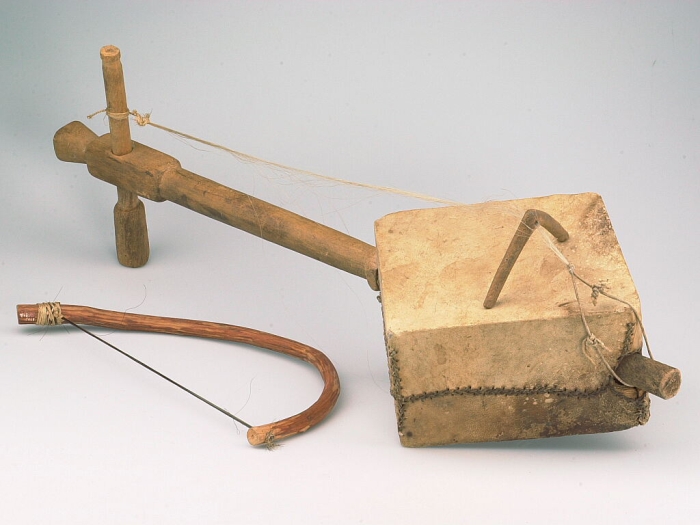
BY MESERET BEHAILU
Wagnew Ashenafi is a vocalist who has unique talent in playing the traditional musical instrument called Masinko. He hails from Debre Tabor area, South Gondar Zone of Amhara State. He is from a patriot family.
He has been playing Masinko since his childhood. His audiences listen to him with a pindrop silence stuned by his melodic voice while singing to the tune of a Masinko. He used to perform music to give vent to sorrow, joy and other feelings.
Wagnew’s birth place, Debre Tabor is one of the famous places in the country known for the production as well as the nimble hands for playing the Masinko instrument. Before starting playing Masinko, Wagnew had been striving to follow the footsteps of his father and younger brother, who are noted for producing and playing Masinko in the area. Through time, Wagnew found himself as a masterful Masinko maker and player.
He told The Ethiopian Herald that, playing Masinko and writing song verses that synchronize with the mood of the audience is not a cakewalk. It needs a conscious and talented mind. That is why many people are attracted by traditional music.
Being born to a talented family does not always warrant one could successfully play music as there has to be a special talent for every individual. But Wagnew always spend time tuned to music and he even dropped out of school to satisfy his desire for music. Therefore, he couldn’t pursue his education beyond grade ten.
Masinko is Ethiopian traditional musical instrument seen unique for having a single string. For this reason, it differs from similar string instruments like Kirar (lyre) and Begena (harp).
The fingers of the player skillfully dance on the string in order to moderate the sound. This helps to tightening and loosening the cord to create high and low pitch sounds depending on the mood of the player and scales of his songs at the moment. For this reason, fingers have a lion’s share, because of the nature of the instrument.
Wagnew, plays Masinko to convey messages about peace, development, unity, patriotism, love, and the like. He also plan to press ahead with continuing singing on these issues in the future.
For want of thorough researches, it proves difficult to know the exact person who made the traditional instruments for the first time. But, some indications show that shepherds, boys who kept birds away from cropland, and the like are among the people who played a midwifery role in the birth of the instruments. Therefore, conducting research will have an important role to know the original producers and preserve their knowledge to produce more instruments.
These days, to get attention and fame, some foreigners are adopting Ethiopian traditional music including the dancing styles. Therefore, concerned bodies should give serious attention for the culture so as to protect it from the negative impacts of globalization (cultural contamination) and transfer it for the next generations.
Masinko can be made from wood, horse’s tail and leather. Then the Masinko player plays it in various pitches depending on the situation.
This instrument is not only helpful to express happiness. It also helps during mourning, spiritual worships. By doing so, the players crave for preaching peace and conveying history. In so doing, they can create heroic citizens and consolidate social interaction.
In the Ethiopian history, Masinko players are known for praising and criticizing peoples while they are singing. For example, players admire the heroic one when s/he accomplishes adventure on the battlefield. And the reverse is true as they use their Masinko to blame or offensively strike the cowardice and heinous. Likewise, the players admire productive farmers and insult the lazy farmers.
This shows that the songs and talents of the players have power to change the timid to heroic. Meaning the heroic is emboldened to register additional heroic deeds and the coward get ready to join the ranks of the heroic. In fact, the sound is unique, the players are talented and the song verse is full of imagery. No one simply understands the song verse. It rather requests serious attention and further investigation.
The instrument is not only used for emboldening solders or citizen to protect their country through military prowess, but also used for praying and playing in Ethiopian Orthodox Church to praise for God.
Currently, Masinko houses are ubiquitous in various parts of the country. The artists help preserve cultural values and art simultaneously ensuring their benefits from it. Similarly, some players have been walking in different parts of the country in order to provide their talents and the reward is obtaining some incentive from it.
Meanwhile, a Masinko traditional music instrument is rendering various advantages for players, audiences, and the country as a whole. These days, people form a little group around play houses in order to enjoy and get relief from stress. Therefore, developing the sector, protecting culture, and the like are not a matter of choice, they rather are the responsibility of everybody
The Ethiopian Herald 16 January 2021





I have been browsing online more than 4 hours today, yet I never found any interesting article like yours.
It’s pretty worth enough for me. In my opinion, if all website owners and bloggers made good
content as you did, thhe internet will be a lot more useful than ever before. http://Boyarka-Inform.com
Login Laskar288– Rekomendasi Situs Slot Gacor Hari Ini Deposit Pulsa Tanpa Potongan